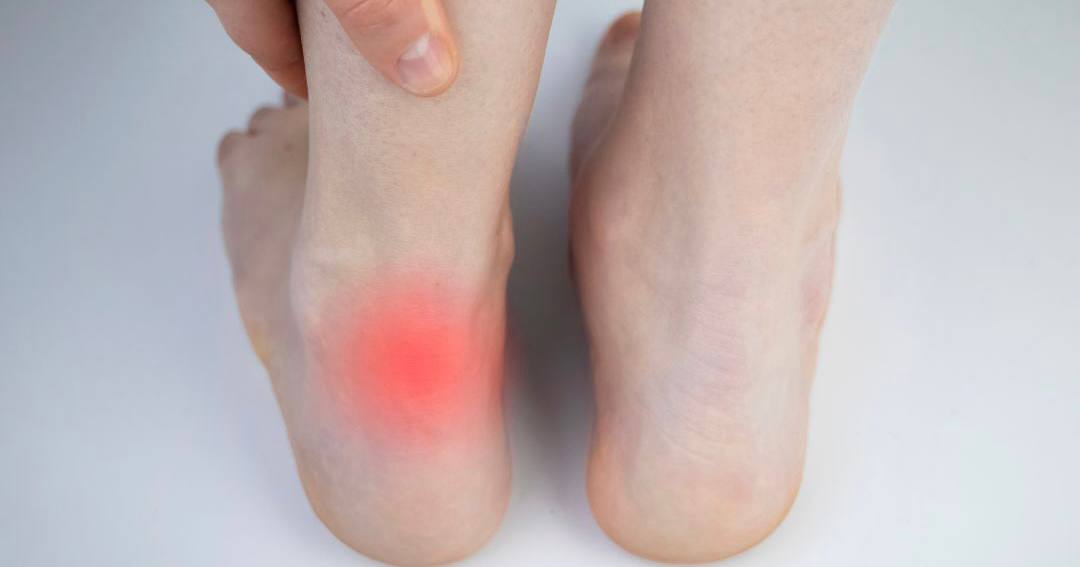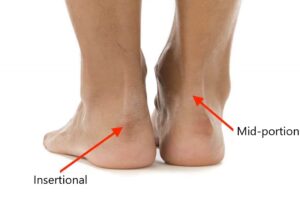
Achilles tendon injury is one of the most common injuries sustained by runners. This is often due to the repetitive nature of tendon loading and weight-bearing in many activities.
Two types of Achilles Tendinopathy
Achilles tendinopathy is separated into two types: (1) Insertional, (2) Mid-portion; this distinction serves to guide management of the condition as it progresses through the stages of recovery.

(Image credit: Kinetic Labs)
Common symptoms include:
- Morning stiffness and pain around the Achilles tendon and calf area
- Tenderness along back of heel and tendon
- Pain with activities such as running, walking up/down stairs, jumping
- Increase in pain the day after exercise
3 Key Stages of Achilles Tendinopathy rehabilitation:
1. Isometric Stage
Isometric loading is important during the initial stages of rehabilitation. This is when the tendon is most reactive, hence the use of isometric exercises to load the tendon to a comfortable degree without further irritation. The key here is repetition throughout the day depending on the reactivity of the tendon.
2. Isotonic Stage
Progression from isometric to isotonic exercises can begin once the pain level and tendon irritability has reduced. The key focus of this stage is to strengthen the tendon itself alongside the calves, whilst being mindful to avoid compression of the tendon at end ranges.
3. Plyometric Stage
The third stage of rehabilitation focuses on improving the tendons’ ability to absorb and release energy in a functional environment. This involves exercises based around the stretch-shortening-cycle, which occurs whenever the athlete lands and pushes off from the ground. The focus here is to build functional strength within the musculotendinous complex with carry-over effects to the athlete’s sport.
Shockwave Therapy for Achilles Tendinopathy
Shockwave therapy has been shown as an effective treatment modality for Achilles Tendonitis that has progressed past the initial acute phase.
A study (Furia, 2006) comparing shockwave therapy with conservative treatment including rest, footwear modification, stretching and strengthening, found that shockwave therapy was statistically significant in improving pain. The patients in the shockwave treatment group reported an average of 5 on a 10 point visual analogue scale in pain reduction.
Rompe et al. (2008) conducted a randomised controlled trial comparing shockwave with eccentric exercises, and found statistically significant improvements in pain and function at 4-months post treatment for the shockwave group.
Hence the evidence shows that shockwave treatment, when combined with regular physiotherapy treatment and guided exercise progression, will most likely result in the best possible outcomes for injury recovery and return to sport for Achilles Tendinopathy.
References:
Al-Abbad, H. and Simon, J.V., 2013. The effectiveness of extracorporeal shock wave therapy on chronic achilles tendinopathy: a systematic review. Foot & ankle international, 34(1), pp.33-41.
Chimenti, R.L., Cychosz, C.C., Hall, M.M. and Phisitkul, P., 2017. Current concepts review update: insertional Achilles tendinopathy. Foot & ankle international, 38(10), pp.1160-1169.
Furia, J.P., 2006. High-energy extracorporeal shock wave therapy as a treatment for insertional Achilles tendinopathy. The American journal of sports medicine, 34(5), pp.733-740.
Rompe, J.D., Furia, J. and Maffulli, N., 2008. Eccentric loading compared with shock wave treatment for chronic insertional achilles tendinopathy: a randomized, controlled trial. JBJS, 90(1), pp.52-61.